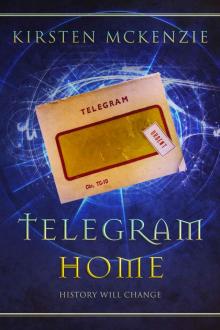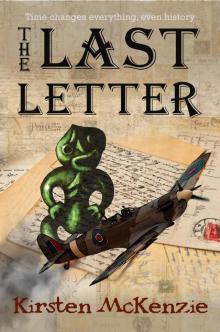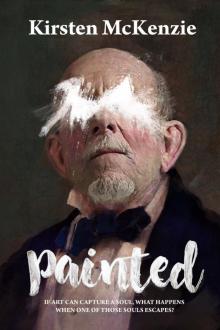- Home
- Kirsten McKenzie
Telegram Home Page 2
Telegram Home Read online
Page 2
Sanjay had only the barest of notions of the layout of the room, but ducked sideways away from the monster, the candelabra forgotten, his immediate concern being his own safety.
The man’s accented words alien to Sanjay, who had no chance of recognising French anymore than Arabic or Mandarin.
Then lightning flashed again, and for the briefest of moments the pair stared at each other, the man freezing in the electric light as he caught sight of the box jammed under Sanjay’s arm. The light reflecting off the intricate golden leaves on the sides of the betel box, held the Frenchman in a trance, before the light faded to black, allowing Sanjay the smallest fraction of a second to run past the workman and through the doorway.
Sanjay ducked and weaved through the building seeking a way out. The silversmith grabbed for the boy. Sanjay stumbled, slicing his face on the corner of a desk. Screaming in pain he dropped his enchanted box, clutching at the flap of skin. The hulking man hollered for help as he loomed closer, so Sanjay abandoned his treasure and ran for his life. Although petrified that the lightning would strike him the same way it had Navin at the observatory, Sanjay fancied his chances against the elements better than he did against the giant. So he ran, and ran, and ran. Away from the angry man, away from the building stuffed full of silver. He raced through the empty muddied streets until he found the half finished carcass of a new build, barely watertight and uninhabited except for the rats which sought their own shelter from the rain. Sanjay scuttled into a dark corner, panting and shivering, his face throbbing, the blood running freely down his face. And despite, or maybe because of, his ordeal he fell asleep, his dreams no more miraculous than the nightmare he was living through now.
The Silversmith
‘Don’t know how he got in, but he’s scarpered now. Never seen him in my life, some urchin I’d wager,’ said Arthur the silversmith to his supervisor the next morning, as he relayed the adventures of the night.
‘And there’s nothing missing?’
‘Nought I could see.’
The men wandered through the labyrinthine rooms of the converted house, poking into long-forgotten corners and behind giant pieces of decaying furniture, devoured by hungry beetles. A haze of dust danced in the weak light coming from the covered lanterns the men carried.
‘Perchance, was he sheltering from the storm?’ the supervisor suggested, a kinder soul than the silversmith.
Arthur shook his head, his mind flicking back to the box he’d hidden in the chimney cavity of an unused room, waiting for him until he had a moment of solitude to examine it. A masterful piece had been his only thought when he’d rescued it from the floor last night. A stroke of luck, and one he wasn’t going to share with his employer or colleagues.
‘Then put it from your mind, Arthur, nothing is missing. Let’s get back to those candelabra. The church is picking them up today and they need a final polish.’
Two hours later, Arthur threw his polishing cloth down and stretched his arms above his head. The more he’d polished the huge pair of candelabra, the more resentment gnawed at him, eating him up from the inside. His initials weren’t around the edge of the candelabra, nor was it his name they’d praise for the fine workmanship. Oh no, it was the Frenchman who’d get all the glory, like usual. Arthur had a fair level of skill and an eye for detail, but the workshop wasn’t his — he was only a tool of the famous Paul de Lamiere. de Lamiere was prolific in his output, but only because of people like Arthur doing the donkey work for him, and Arthur was over it. He’d toyed with incorporating his own moniker somewhere within the intricate design, but lost his nerve. That he hadn’t made the candelabra wasn’t relevant; he’d worked on them, for weeks. They all had. If only he had enough money to start his own workshop. His mind drifted back to the silver box, wrapped in a white coat, and stuffed up the chimney in the other room. They didn’t bother heating the rooms no one worked in, and no one lived here now that de Lamiere lived in a fancy home in a better part of town, a place awash with servants doing everything for him, just like they all did here.
Somewhere a bell rang, the clergy come to pick up their candlesticks. Arthur retrieved his cloth and buffed an imperceptible mark from a Rococo arm. One candlestick would set him up for life, several lives. As the voice of de Lamiere came closer, Arthur made himself scare — his sort didn’t mix with the clientele. His sort worked behind the scenes, like little church mice, but not for much longer; he planned to return home to Salisbury. He’d sell the box where people there would pay good money for it. And then he’d set up a workshop to rival de Lamiere. He’d passed his apprenticeship and had his Guild membership; he was only lacking the funds. Arthur’s pride ran away on him as he considered his future good fortune, and the afternoon passed in a fuzzy haze of day dreams and fantasy. He never gave a thought to the boy; the owner of the valuable box.
There were no opportunities to rescue the box that evening. They were celebrating the award of a large order for a distinguished client — twelve sterling dinner plates with gadrooned edges, and a dozen matching salad plates, second course dishes and tureens, and sundry other items, for an Earl no less. As a group, they were off to celebrate the commission, so Arthur shelved his plans for the night. There’d be another night. Never one to miss an opportunity to avoid time at the workbench, he traipsed out behind his colleagues, leaving the heavy door to shut behind him.
Arthur expected someone else to lock the door which is why he didn’t check it. They had never given him a key despite lesser men than him having one, which irked him. All his life he was a moment too late, a fraction too slow, the second choice. They needed to give him a chance to prove himself, and how could he if they refused to trust him with keys to the building? He bumbled along behind, hands deep in his pockets, protecting them against the bitter chill of the afternoon. He swore that Salisbury never got this cold. London was always frigid, with a fog you couldn’t breathe through. It was like wading through stew, and tonight was no different. The sun hadn’t even set yet fog nipped at his ankles and wormed its way through the heavy fabric of his trousers.
‘Oi, wait up,’ he called to the others as they rounded a corner, disappearing from sight, the gloom muting their convivial laughter, dulling their footsteps.
Arthur broke into a trot, trying to catch up with them. He hadn’t bothered listening to which pub they were going to for their celebrations, and he didn’t want to be the idiot turning up at the wrong one.
‘Oi!’ he called out again.
Running round the corner, Arthur caught his foot on a loose cobble, sending him sprawling to the ground, catching his chin on a curb stone.
The fog muted most things, but not the crack of Arthur’s jaw breaking as it connected with the cut stone. He lay there, in the gutter still wet from the downpour the night before, the thick grey mist masking his existence. He could barely groan through the pain. Broken, and dislocated, it would be a long time before he’d be able to use his teeth to tear the meat from a lamb chop.
Arthur struggled onto his elbows and tried calling out, the effort leaving him woozy. Surely someone would come looking for him? He probed his teeth with his tongue. At least he had lost none of those. A dark depression settled over him as he imagined the weeks ahead of him where he’d only be able to eat watery soup or stew. If his colleagues had only waited for him, this wouldn’t have happened. The blame was on their shoulders.
Although slipping into the clutches of shock, Arthur heard the staccato clip-clop of hooves as a wealthy trader made his way along the fog-encrusted street towards his own home not ten doors up from where Arthur lay. The trader had enough trouble controlling a horse spooked by the mist, to identify that the pile of rags on the ground was a man. The horse did though and reared up in fright as Arthur raised his mangled hand to warn the rider.
And what goes up must come down, and thus the horses fine Arab hooves destroyed the remaining shape of Arthur’s jaw, caving in his skull. His dreams of owning a workshop disintegrating on
the filthy cobblestones of the London street. His hopes of personal glory splashed up the young legs of a stallion and over the boots of his rider, who was oblivious to what had happened beneath his beast.
Even in death, Arthur missed out on his moment of fame. For although he made it into the paper, it was only as a footnote.
Man found dead on the road, struck by a horse. Identity unknown.
LONDON
The Girlfriend
‘Bryce?’ called the high-pitched American voice, the one belonging to Melissa Crester.
Bryce Sinclair paused at the threshold, both feet on the old black and orange tiles of The Old Curiosity Shop’s entrance.
‘Yes?’
‘I’m tired, I don’t want to go into a junk shop.’
‘I won’t be long. Just wait here,’ Sinclair replied, his hand tightening on the door handle.
Whilst Melissa had spent the day humouring her amusingly naïve and somewhat backward companion, she was unaccustomed to not being obeyed.
‘Bryce, I’m serious. If you go in there, I won’t be here when you come back,’ Melissa said, pulling a cellphone from her designer handbag, tapping away at the screen. ‘I’m booking an Uber now,’ she added.
Melissa smiled as Sinclair backed out of the shop, just like a little puppy dog called to heel.
‘Excellent choice. We’ll go to my room, drop these bags, freshen up, if you know what I mean,’ Melissa said, winking. She may have been able to move her eyelids but the rest of her face was as immobile as Stonehenge. ‘Then we’ll head over to the Savoy for cocktails and dinner. Yes?’
Sinclair nodded, his rugged scowl exciting her more than it should. Treat ‘em mean and keep ‘em keen. That was her motto. Once she returned to America, he’d been a thing of the past. She never took her playthings home, they were purely holiday entertainment.
After another satisfactory tumble, Sinclair lay ensconced in the Egyptian cotton sheets and considered his options. Carry on with Melissa, enjoying her largesse, and spending his nights in a luxury he’d never imagined existed, or ditch her and continue tracking down that bitch Sarah Bell, or Sarah Lester as he now knew her. He should’ve ignored the frozen-faced cow when she threatened to leave him outside of The Old Curiosity Shop. So what if the place was a junk shop, it was where he was going to find Sarah. And after that he’d wring her skinny white neck and make her tell him how all this was possible. How he’d been in Bruce Bay in New Zealand one minute, a sack of silverware slung over his neck and next minute, he was in London, where the shops glowed with sunlight every hour of the day. Where women dressed like prostitutes and no one batted an eye. And he hadn’t seen a single horse, only carriages with engines leaching out fumes, filling every street. And the noise. There was music everywhere, and honking, and shouting, and thousands of people of a dozen different colours, speaking a hundred languages.
And here he was, Bryce Sinclair, who hadn’t made it to school once since he was ten. Arrested more times than he cared to remember, but he had his own boat, a son, and a satisfactory life. No, that wasn’t true. He couldn’t claim satisfaction, but it was a comfortable life, one which suited him, or so he thought. He’d supplemented his income in a variety of ways, none of them legal, but it made things interesting. But once he laid his hands on Sarah Lester, and found out her magic, he would live this way forever, in luxury. He quite fancied staying in hotels and ordering whatever he desired whenever he liked. He ran his eye down the room service menu. With half of it in a foreign tongue, he couldn’t decipher it. What the hell was quinoa? Or dragon fruit?
‘Ready, lazy bones?’ asked Melissa, resplendent in another gown too far north from her knees for comfort, and too far south from her neck to be decorous.
Despite Sinclair’s proclivities between the sheets, he felt a flush creep up his cheeks. Being in public with a woman dressed like this didn’t seem right, regardless of which century he was in. What she wore in bed didn’t matter, but if she was going out with him, he didn’t want her dressed like a brazen hussy.
After some quick thinking, he replied ‘Didn’t you already wear that?’
Puzzlement danced across her frozen features, before she shrugged and returned to the dressing room. Through the gap in the door he watched her throw the sparkly number to the floor. Good.
Sinclair stretched and got up to retrieve his trousers and shirt. They’d do.
‘You ready?’ he called out, his macho swagger back online. His smile widened as he took in the long dress she’d chosen to wear instead.
‘That’s better,’ he said.
‘This is Chanel, that other one was by Mizrahi.’
Her answer as confusing to Sinclair as the menu had been.
Drinking cocktails at the Savoy were not the same as knocking back a pint at the pub in Bruce Bay. Sinclair suspected everyone knew he was an imposter, from the wait staff to the other diners. The only one oblivious to his comfort was Melissa, who’d hooked up with some friends upon their arrival at the hotel bar, and was guffawing loudly about the stupidity of the English currency and a comparison of the prices of the antiquities they’d purchased this season. Sinclair’s collar barely restraining his belligerence as he swallowed his third shot of some fancy whisky she’d ordered him. He hadn’t even ordered his own drinks.
Sinclair’s gaze wandered across the crowd. Every single one of them dressed in outfits they’d never survive in back in his day. The shoes the women wore were lethal weapons, and the men just as perfumed. He couldn’t stomach it anymore and made a mumbled excuse to leave the room. He was quite sure Melissa barely noticed him leaving, too tied up with her fancy friends discussing who the best dealer was selling Syrian artefacts — the hottest stuff in the market right now. Sinclair shook his head and stumbled from the bar, the doorman rushing to hold open the door least he mar the polished brass with his meaty paws.
The noise was no better outside — the perfume replaced with car fumes and something else. Seeping odours of decades of pollution, absorbed by what little of the earth remained exposed in the heart of London, and as much a part of the fabric of every brick and every cobble in the city. The stench of the streets matching the dark stain of Sinclair’s soul.
He knew he could carry on enjoying everything Melissa had given him with a twist of his hands around her neck. He’d watched her hand over a small card when she paid for something, and it hadn’t taken long for him to realise he required one of those. His unusual gallantry had seen his cash reserves depleted more than he liked to think about and he needed to fix that before he gave up the golden goose holding court inside — he just couldn’t get over how her face was incapable of movement. It was fun, but he had pressing issues to settle, and no bit of skirt would get in his way.
‘Are you all right, sir?’ asked the concierge, dispatched outside to check on the rough looking man loitering in front of the Savoy.
Sinclair glanced at the man, in his smart uniform and his polished shoes. He wouldn’t have looked out of place if he’d come straight from the 1860s. Sinclair had never stepped foot in a place like this, but imagined the concierge looked exactly like a concierge back in the day.
‘How long’s this place been here?’ Sinclair asked.
‘This is the original site of the Savoy Palace, built in 1263. The site has been through several iterations, and the buildings have no resemblance to any of the initial structures. The only remaining historical structure is the Savoy Chapel, completed in 1512—’
‘I didn’t ask for a history lesson, I just wanted to know how long the hotel had been around,’ Sinclair interrupted.
‘1889,’ said the concierge, checking behind him to ensure other staff were close enough in case he had need of them.
‘Good, I might move here for a while. Depends what my lady friend wants to do though. It doesn’t stink of shit like where I come from.’ And with that Sinclair wheeled back inside the building to rejoin Melissa. And this time he’d order what he wanted to drink.
> The Shop
When Sarah Lester stepped from her staircase into the eclectic gathering of people in her antique shop, her appearance was like the application of a defibrillator to the heart — shocking the frozen scene into life and nothing would ever be the same again.
Every person in the room began at once, the chorus of comments overwhelming the cramped space.
‘Miss Lester?’
‘Where have you been?’
‘Sarah, when did you—’
‘We’ve been waiting to interview you.’
‘My statue—’
‘I can explain,’ Sarah said.
‘Best to do that at the station,’ Inspector Fujimoto replied, trying to diffuse the peculiar situation. ‘I’m Inspector Fujimoto, and we’ve got some questions for you. If you’d be so kind to come with us to the station?’
With no way out, Sarah nodded. ‘I’ll get my things,’ she said.
‘No, no, no!’ Shalfoon shouted, his face flushed. ‘What about my statue? I need my statue.’
‘I thought you said the statue belonged to the church? That you were reclaiming it for the church,’ Fujimoto said, his eyebrows disappearing into his thinning hairline.
‘Yes, yes, of course it belongs to the church. Please, it’s very simple, they just need to hand it over. You have the required paperwork. I’ll take the statue and leave it to you to sort out this… thief.’
‘What?’ Sarah said.
‘Your accusations are without merit,’ Brooke said, stepping out of the shadows.
‘No one is taking anything,’ Fujimoto said, dampening the tension in the tiny shop. ‘Mr Shalfoon, you aren’t helping things by remaining here.’
‘But my statue—’
‘No one is taking any statues today, apart from us as evidence of… of what I’m not sure yet. But that’s what the law does, we analyse the evidence without jumping to conclusions,’ Fujimoto interrupted.

 Telegram Home
Telegram Home The Last Letter
The Last Letter Doctor Perry
Doctor Perry PAINTED
PAINTED